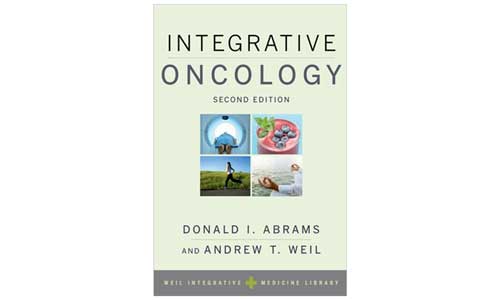Green tea and its extracts may provide substantial benefit for body terrain factors, especially body weight, high blood sugar and insulin resistance, inflammation, oxidative stress, each of which is linked to cancer development and growth.
How do experts use green tea or EGCG?
Integrative experts provide recommendations for green tea or EGCG in treating people with cancer. Learn more about the approaches and meanings of recommendations ›
Published protocols, programs, and approaches
These protocolsa package of therapies combining and preferably integrating various therapies and practices into a cohesive design for care, programs, and approaches by leaders in integrative cancer care use or recommend green tea or EGCG.
We do not recommend specific integrative protocols or programs but provide information for you to evaluate with your healthcare team.
Lise Alschuler, ND, FABNO, and Karolyn Gazella
Alschuler LN, Gazella KA. The Definitive Guide to Cancer, 3rd Edition: An Integrative Approach to Prevention, Treatment, and Healing. Berkeley, California: Celestial Arts. 2010.
Alschuler LN, Gazella KA. The Definitive Guide to Thriving after Cancer: A Five-Step Integrative Plan to Reduce the Risk of Recurrence and Build Lifelong Health. Berkeley, California: Ten Speed Press. 2013.
These books describe approaches for certain cancer types, or along with certain conventional therapy treatments, or for particular conditions such as insulin resistance.
Uses of green tea or EGCG:
- Bladder cancer
- Brain cancer
- Breast cancer
- Colorectal cancer
- Gastric cancer
- Head and neck cancer
- Kidney cancer
- Leukemia
- Liver cancer
- Lung cancer
- Melanoma
- Ovarian cancer
- Pancreatic cancer
- Prostate cancer
- Soft tissue sarcomas
- Detoxification
- Anti-inflammatory
- Immune-enhancing
- Insulin resistance reversal
Keith Block, MD
Block KI. Life over Cancer: The Block Center Program for Integrative Cancer Care. New York: Bantam Dell. 2009.
The integrative Block Program has recommendations to people who are at different places along the cancer continuum:
- Those who’ve been recently diagnosed
- Those in treatment
- Those who’ve concluded treatment and need to remain vigilant to prevent recurrence
Uses of green tea or EGCG:
- Surgical support program: inhibit blood vessel formation (angiogenesis)
- Radiation support formula
- Targeted molecular therapy
- Part of an anticancer diet plan: antioxidant, blocking tumor-fueling enzymes
- Part of a combination circulatory support supplement
- Remission maintenance program: preventive of recurrence
Lorenzo Cohen, PhD, and Alison Jefferies, MEd
Cohen L, Jefferies A. Anticancer Living: Transform Your Life and Health with the Mix of Six. New York: Viking. 2018.
This book introduces the concept of the Mix of Six, which is identical to six of our 7 Lifestyle Practices ›
Dr. Cohen and Ms. Jefferies explain that while each plays an independent role, the synergy created by all six factors can radically transform health, delay or prevent many cancers, support conventional treatments, and significantly improve quality of life.
Gerald M. Lemole, MD; Pallav K. Mehta, MD; and Dwight L. McKee, MD
Lemole GM, Mehta PK, McKee DL. After Cancer Care: The Definitive Self-Care Guide to Getting and Staying Well for Patients with Cancer. New York, New York: Rodale, Inc. 2015.
These doctors present easy-to-incorporate lifestyle changes to help you “turn on” hundreds of genes that fight cancer, and “turn off” the ones that encourage cancer, while recommending lifestyle approaches to address each type.
Uses of green tea or EGCG:
- Bladder cancer
- Breast cancer
- Colorectal cancer
- Endometrial cancer
- Leukemia
- Lung cancer
- Lymphoma
- Melanoma
- Prostate cancer
- Thyroid cancer
Barbara MacDonald, ND, LAc
MacDonald B. The Breast Cancer Companion—A Complementary Care Manual: Third Edition. Self-published. 2016.
Naturopathic physician Barbara MacDonald provides information about breast cancer, its conventional treatment, and natural approaches to enhancing treatment, managing side effects, reducing risk of recurrence, and healthy living after cancer treatment is completed.
Neil McKinney, BSc, ND
McKinney N. Naturopathic Oncology, Fourth Edition. Victoria, BC, Canada: Liaison Press. 2020.
This book includes descriptions and uses of many natural and complementary protocols for cancer in general and for specific cancers. It also includes information on integrative support during conventional cancer treatment.
Uses of green tea or EGCG:
- Bladder cancer
- Breast cancer
- Brain/nerve cancer
- Carcinoid/neuroendocrine cancer
- Cervical cancer
- Colorectal cancer
- Esophageal cancer
- Head and neck cancer
- Kidney cancer
- Leukemia
- Lymphoma
- Melanoma
- Multiple myeloma
- Myelodysplastic syndrome
- Sarcoma
- Skin cancer
- Stomach cancer
- Thyroid cancer
- Uterine cancer
- Used as a targeted pathway agent, for inflammation, and for insulin function/blood sugar regulation
Gurdev Parmar, ND, FABNO, and Tina Kaczor, ND, FABNO
Parmar G, Kaczor T. Textbook of Naturopathic Oncology: A Desktop Guide of Integrative Cancer Care. 1st edition. Medicatrix Holdings Ltd. 2020.
This book provides information on the treatment of 24 cancers, plus the most effective treatments of the most common symptoms affecting cancer patients while they undergo chemotherapy, radiotherapy, or surgery.
Uses of green tea or EGCG:
- Breast cancer
- Chronic lymphocytic leukemia
- Hodgkin lymphoma
- Liver/hepatocellular cancers
- Non Hodgkin lymphoma
- Non-small cell lung cancer
- Ovarian cancer
- Stomach (gastric) cancer
Nasha Winters ND, FABNO, LAc, DiplOM, and Jess Higgins Kelley, MNT
Winters ND, Kelley JH. The Metabolic Approach to Cancer. 2017. Chelsea Green Publishing.
This book’s metabolic approach to cancer is a “naturopathic nutrition program that uses the medicinal powers of traditional foods, therapeutic diets and non-toxic lifestyle approaches as cancer counteragents and preventives.“ The program focuses on 10 terrain elements and how to assess them and bring them into balance.
Uses of green tea or EGCG:
- Nontoxic inhibition of blood vessel formation (angiogenesis) and metastasis
- Growth inhibitor
- Increase dopamine levels, which may help improve mood
Other expert assessments
Donald Abrams and Andrew Weil
Abrams & Weil list green tea as effective for reducing risk and treating early stage cancer, listing prostate cancer and lung cancer. They also list it for reducing treatment toxicity of doxorubicin and idarubicin and enhancing antitumor action. They recommend avoiding use during treatment with erlotinib or pazopanib as this can cause CYP1A2 induction.
Moss Reports
The Moss Reports conclude that green tea extract (EGCG) has anticancer properties.
Traditional medicine
Green tea is used in both Ayurveda and traditional Chinese medicine approaches to treating cancer.
Learn more about traditional medicine and how to find practitioners: Finding Integrative Oncologists and Other Practitioners ›
Dosing
One study found greater oral bioavailability of free catechins when taking the Polyphenon E capsules on an empty stomach after an overnight fast.1Chow HH, Hakim IA et al. Effects of dosing condition on the oral bioavailability of green tea catechins after single-dose administration of Polyphenon E in healthy individuals. Clinical Cancer Research. 2005 Jun 15;11(12):4627-33.
Specific dosing recommendations are available from these sources:

Crew KD, Brown P et al. Phase IB randomized, double-blinded, placebo-controlled, dose escalation study of polyphenon E in women with hormone receptor-negative breast cancer. Cancer Prevention Research (Philadelphia). 2012 Sep;5(9):1144-54.
General information about dosing
Find general dosing guidelines regarding natural products and supplements in Dosing Guidelines ›
Keep reading about green tea or EGCG
Learn more
References


